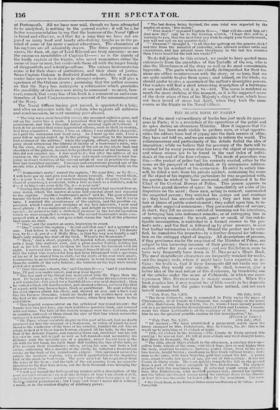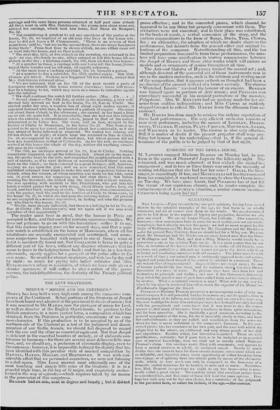THE BLACK BOOK OF PAIqS.*
ONit of the most extraordinary of books has just made its appearance in Paris ; it is a revelation of the operations of the police and its spies during an obnoxious Ministry. How it happens that the original has been made visible to profane eyes, or what opportunities the editors have had of prying into the dark secrets of office, they have not told us, and we are unable to inform the world. The Voluminousness and particularity of the details forbid the idea of imposition ; while we believe that the accuracy of the facts will be vouched for by every person who has been the object of espionage, and whose names are to be found in the vast index of individuals at the end of the four volumes. The mode of procedure was this :—the prafeet of police had his curiosity excited, either by the name on the passport of an individual, or by anonymous infornuition, or by his conduct or his connexion. In order to satisfy himself, he dated a note from his private cabinet, containing the name of the object of his inquiry, the particulars he was acquainted with, the queries he wished to have answered, and addressed it to the Chief of the Central Bureau of Police. This person appears to have been grand director of spies: he immediately set some of his inspectors on the scent ; these men, acting in concert, surrounded the suspected person ; they watched his goings out and comings in ; they beset his servants with queries ; they met him face to face at places of public entertainment ; they called upon him, to inquire after supposed connexions ; they presented oilers of service; in short, they left no means untried of worming out his intentions, of betraying him into indiscreet remarks, or of entrapping. him in some unwary moment : the result, great or :small, of this indefatigable investigation, is embodied in aformal answer to the prefect's note ; and the first is followed up by other answers, in ease that further information is elicited. Should the prefect not be satisfied, he stimulates the inspectors by a further demand for information on the unhappy object of inquiry. All descriptions of persons, if they perchance excite the suspicion of the Minister of Police, are subject to this harassing invasion of their privacy: there is no exception either for rank or country ; and our Englishmen seem to have very frequently been down in M. DELAVAU.S Black Book. The most insignificant characters are frequently watched for weeks, and the inquiry ends, where it might have been expected, in nothing : the truth is, that if these documents did not excite our indignation, they would our ridicule. We shall, however, give a better idea of the real nature of this disclosure, by translating one of the articles under the name of Cobianchi, in which our countrywoman Mrs. HUTCHINSON is mainly concerned. When this book reaches her, it may remind her of little events in her domestic: life which none but the police. would have noticed, and not even herself remembered.
" Cab. Port. No. P,376. 5th July, 1822.
"The Sieur Cobianchi, who is concealed in Paris under the name of Chiaramonte, or of Comte de Clermont, has sought refuge in the house of Mrs. Hutchinson, Rue de Chichi, No. 28, whom I have already pointed out as a go-between for the Revolutionists of Paris and London. I recommend the Sieur Cobianchi to all the vigilance of M. Hinaux.. I request him to use the greatest possible caution in this investigation," &c.
(Prefect of Police.) " Cab. Port. No. 9,73/I. 14th July, 1822. " 1st Answer.—We have established a permanent watch upon the house occupied by Mrs. Hutchinson, Rue de Clichy, No.28 : this is the result up to yesterday at 11 o'clock at night. " 11th, six o'clock in the evening.—The Comte de Crety arrived this evening : he was on foot. Be left at nine o'clock and went straight home, Rue Basse do Rempart, No. 32. "The 12th, about three o'clock in the afternoon, a carriage drew up— yellow body, wheels of the same, with black lines, box or seat higher than the body, contrary to custom: lanterns plated silver, fixed to the seat ; two horses, bright brown ; coachman in blue frock without livery ; footman in the same, with knee breeches, gold lace round his hat. A young man, about twenty-five years of age, got out of this carriage : it was the Count de Grety again. He went quickly towards the left on the ground floor; a part of the house occupied by Mrs. Hutchinson. The carriage departed with the coachman alone." ;It returned about seven o'clock— then Mrs. Hutchinson, with anothei younger lady, dressed for visiting, and the before-mentioned young mant:the carriage drove to the Marais. At least this was the order we heard gin to the coachman. The same
* The Black Book, or the Political Police under the Ministry of M. Viliele. 4 rols, Paris;1620.
carriage and the same three persons returned at half past nine o'clock. AB three went in with Mrs. Hutchinson : the young man alone came out, entered his carriage, which took him home, Rue Basse du Rempart, No. 32.
" Not considering it prudent to ask any questions of the porter at the house, No. 28, we inquired of an old man who lives in the house whe ther he did not know a M. Chiaramonte. There is no person of that name here,' said he, but see on the second floor, there are many foreigners living there.' From that time to eleven o'clock, no one either came out or went into the house, and we then retired. "The next day, 1:3th, at five o'clock in the morning, we returned to the spot : no one, absolutely no one, either entered or left this house till one o'clock in the day ; a hackney coach, No. 607, then set down two females. "At a quarter to three, a carriage with one horse left the house,it contained three females and an old man, all equally unknown. "At the same hour a hackney cabriolet, No. 78, brought a person. " At a quarter to five a cabriolet, No. 3329, arrived empty. Mrs. HutWilson got into it. Nothing new happened till ten o'clock, except that Mrs. 1 I otT:hinson returned alone.
" We are informed, that on the .5th of the next month a party of foreigners who inhabit this house remove elsewhere ; there will therefore be aJodging to let, which may serve as a means to introduce agents into the interior.
" We shall continue the watch till further orders. (Mac Ch s ..) " Second Answer.—The 14th July, at eight in the morning, a very well. dressed lady arrived on foot in the house, No. 28, Rue de Mehl. She carried under her arm, a wooden box of about eight inches square ; it appeared fastened with care, by means of a padlock of copper. She came out about three o'clock in the afternoon ; she carried in her hand a little sac or ridicule quite full. It is remarkable, that she had not this ridicule when she entered; a circumstance which, joined to that of the casket, determined us to follow her. She went, still on foot, straight by the barrier of Clichy to Mousseaux, in the house No. 27. This woman ap peared to be upon her guard, and looked about her continually, as if she was afraid of being followed or observed. We waited her coming out till ten o'clock at night; at which hour she returned to Rue de Clichi, No. 28, accompanied by a well dressed man, but whose person did not bear any resemblance to that of Cobianchi. As for the rest, no carriages arrived at this house theWhole of the day, neither did anything observable pass in the vicinity. " The ltith, no carriages arrived at No. 28, Rue de Clichy. Nothing remarkable happened, except the following fact. About six in the morn ing, the porter came to the gate, and examined the neighbourhood with a sort of anxiety, as if he were desirous of assuring himself there was nobody on the watch ; we then removed to a great distance, still, however, keeping an eye upon the gate ; and we now remarked, that this same
individual returned four times to make this sort of inspection before ten o'clock, when the woman, of whom mention was Made on the 14th, came
out, (a good reason for supposing she had slept there;) but before crossing the threshold, she looked into the street with evident anxiety. She was speaking with warmth to Mrs. Hutchinson, who put into her hands a sealed packet tied up with string, about fifteen inches long, six broad, and two thick, wrapt up in cloth. This woman, thus commissioned with the packet, took the road to the barriere of Clichi to Mousseaux, in
the house No. 27, to which she had gone the evening before. At present we are occupied in a Manner unverceirrt, in finding out who the persons are who live in this house, No. 27.
" We Sir, have already indicated, that there is a lodging to let in No. 28, Rue de Clichy (Mr. Hutchinson's) and we again ask if we may avail ourselves of this opportunity."
The reader must bear in mind, that the houses in Paris are occupied in flats, and that each fiat contains numerous families. We have not patience to go on with this translation : suffice it to say, that tins curious inquiry goes on for several days, and that a separate watch is established o. n the house at Mousseaux, where all the inhabitants are severally enumerated and scrutinized, and numerous conjectures hazarded with respect to one of them ; when at last it is accidentally found out, that COBIANCHI is living in quite a dinrent part of the town, without any disguise whatever ; that his name is down in the lodging-house book ; and that he, in a 1-i‘v days afterwards, openly applies for a passport at the police office in his own name. So much for eternal suspicions, and watches by day mid by night : so much for prying into ladies' reticules and Mrs. HuroniNsoN's riding in cabriolets, of which we have only given a slender specimen: it will suffice to give a notion of the perseverance, the indefatigableness, the dexterity of the French political police.



















 Previous page
Previous page